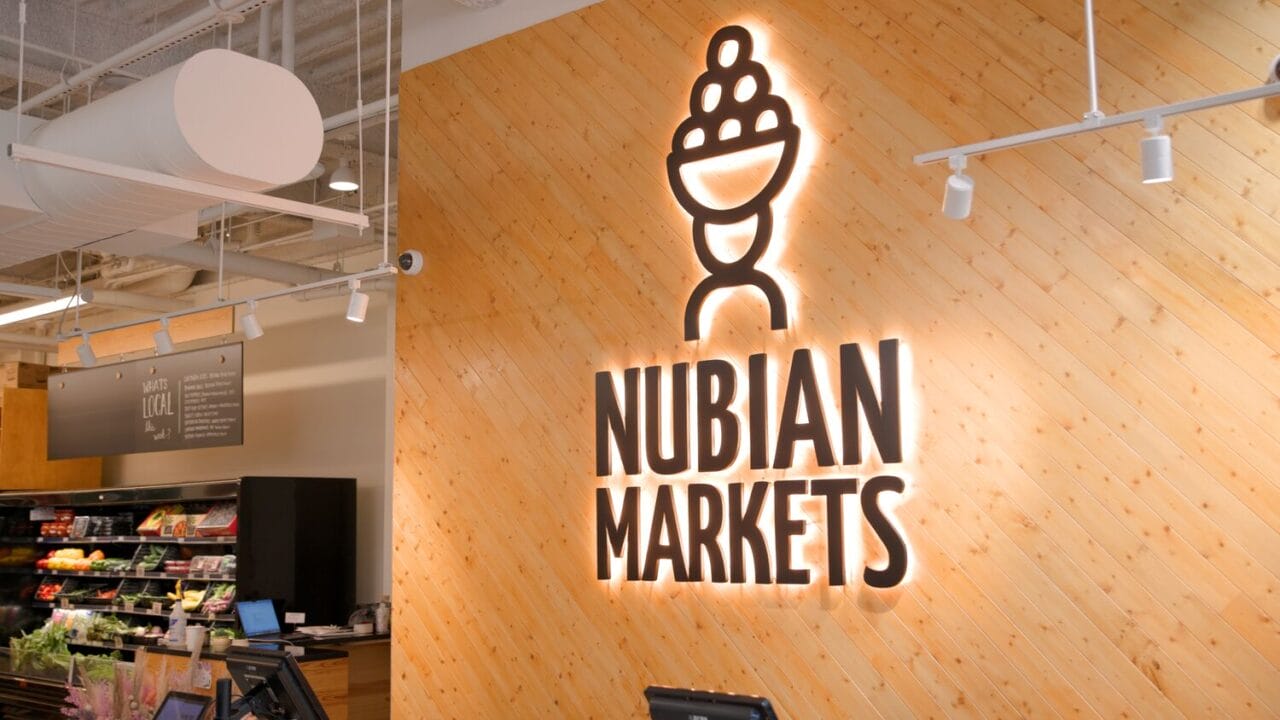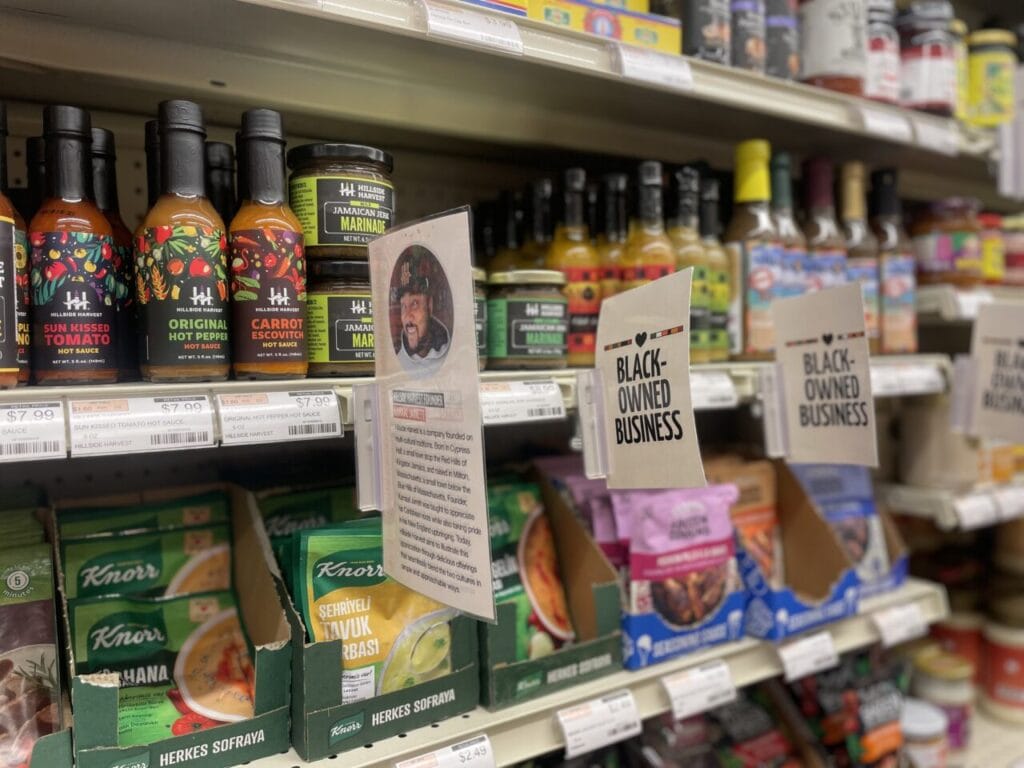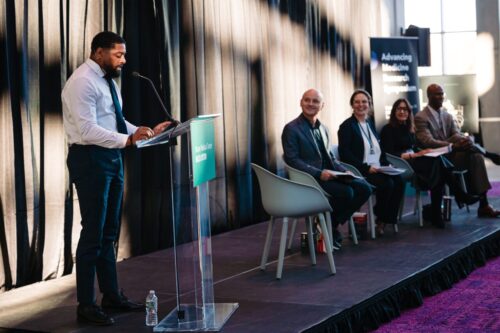At One Year, Nubian Markets Is a Thriving Hub for the Community
November 22, 2024

Jeff Fernandes
Nubian Markets, Roxbury, MA
Nubian Markets serves a diverse Roxbury neighborhood with groceries and café items flavored by the African diaspora, a community gathering space, and local hiring with advancement opportunities.
Roxbury’s Nubian Markets celebrated its one-year anniversary this summer. The combined grocery, café, halal butcher, and gathering space opened with fanfare last year in Nubian Square, the historic heart of Boston’s diverse Black and African American communities. On June 1, some 500 visitors stopped by for a first-anniversary block party celebration, savoring unique dishes celebrating flavors of the African diaspora.
While roughly 1 in 5 small businesses in the U.S. fail in their first year — and 8 in 10 Black-owned businesses fail within a year and a half — the owners of Nubian Markets over 15 months have grown its workforce to 13 employees (and are still hiring), substantially built up its catering capacity, expanded the cafe menu to include breakfast, and started eyeing expansion into other Boston neighborhoods.
From the start, business owners Ismail Samad and Yusuf Yassin have aimed not only to provide fresh, healthy, culturally diverse foods, but to create a true community hub. They spent much of the first year building and nurturing a customer base and tweaking their café and grocery offerings to meet the requests of the diverse community. The grocery store is packed with an evolving inventory, ranging from basics like milk, bread, and fresh produce to an immense variety of spices, coffees, grains, and sauces, many of which are marked with signs indicating “Black owned business” or “Direct source West African product.” The café menu highlights African- and Caribbean-inspired ingredients like Jamaican jerk sausage, coconut ginger rice, yams, yucca, and plantains.
Hiring locally, offering a path upward
One of the founders’ goals was to boost the local economy by hiring from the local community. Yassin, who is general manager of the business, says 80 to 90% of employees have come straight from the local neighborhood, or even right in Bartlett Station, the mixed-income residential and retail development that surrounds the market. “Some of them actually live upstairs, directly above the market,” says Yassin.
What’s more, says Asim Shakur-DuVall, café and catering manager, they’ve been able to offer paths upward within the business. One employee, an immigrant from Ecuador, started off washing dishes.

“Very quickly it was apparent that she really, really wanted to learn,” Shakur-DuVall says. “And so, she was able to learn more and more English. And then Ismail took her under his wing for about a week and a half showing her how to make our pita bread — one of the staple items we have, that all of our sandwiches go on. She mastered that. And then she started shadowing the head chef a little bit, learning how to chop vegetables, how to roast things, how to sauté. Now she’s fully transitioned to being our lead prep cook.”
Another worker was first a customer, then started working part-time in the café — and recently was promoted to assistant general manager. Two others are working as dishwashers but training to become prep cooks.
“This is something we really anticipate and heavily invest in,” says Yassin, “making sure that people have a career path in the space.”
Raising the bar on catering capacity
This spring, Nubian Markets had an unexpected opportunity to up their catering game when a surge of migrants into the Boston area prompted the state government to open a temporary shelter at the Melnea Cass Recreational Complex, just a half-mile away from the market. Many of the newcomers were Haitian, and Nubian Markets was tapped to provide hundreds of culturally appropriate boxed breakfasts daily for two months. Besides providing a lifeline for shelter guests, the contract helped with cash flow just as Nubian Markets neared the end of its first year, doing an average of 300 meals a day.

“We were always ready to help,” Yassin says. “It was a very early hours, having to set up the kitchen around 5 a.m., so we had to do some restructuring, but it was quite rewarding. As an immigrant myself, it was quite fulfilling to be able to serve newcomers and help them as they transition to become members of the community.”
The team now feels ready and prepared to see more larger-scale catering events and projects.
The shelter contract, which ended in May, had another beneficial effect: hiring a new chef to handle the shelter workload spurred a decision to start offering breakfast in the café. As of mid-July, hungry morning customers can choose not only pastries, but savory items, such as a breakfast sandwich with jerk beef sausage, egg and fire-roasted peppers on house-made pita bread, or an omelet with collard greens, corn salsa and Berber-spiced tomatoes.
Ongoing support for Nubian Markets
An early supporter of the Nubian Markets dream was Boston Medical Center (BMC), located less than a mile away. BMC’s commitment to addressing social determinants of health (SDoH) — non-medical factors in people’s lives that affect health outcomes — has included a $6.5 million initiative for affordable and stable housing, and crucial support for a neighborhood birth center. In 2023, to help jumpstart Nubian Markets, BMC provided a $1 million loan, interest-free. The loan enabled Samad and Yassin not only to open the business, but to plant even deeper roots by purchasing the space.
“It goes along with our role as an anchor health system in the community, being intentional about building more inclusive, sustainable local economies,” Thea James, MD, BMC’s vice president of mission, says. “When you enable people to be self-sufficient and financially secure, they join the line of consumers and are able to contribute to our aggregate economy. For us as an essential hospital, the root cause of everything is going to be economics.”

Petrina Martin Cherry, BMC’s vice president of community engagement and external affairs, says, “We asked what residents needed, and they wanted more access to healthier food, more food access in their neighborhoods. We responded by saying we would do this grocery store. We made sure that we were creating pathways to equity and to building wealth, making sure we had two Black business owners that we could support. All this is very close to BMC’s mission. Everything that we do is with a lens towards equity, and not charity.”
BMC continues to support the business in various ways, including hiring Nubian Markets for catering, holding meetings in the market’s gathering space and checking in regularly with the team. “We didn’t say, ‘Okay, here’s a check. Good luck,’” Cherry says. “We have weekly meetings with them, and it’s not just ‘How are you doing?’ but ‘What can we do together?’”
Yassin concurs. “Boston Medical Center is our cornerstone. In our weekly standing meeting, we brief them on what the market is doing, how we’re doing, and our needs, and we hear their feedback. They’ve been more than we can wish for — very, very helpful.”
Looking ahead
Yassin says they hope to open new Nubian Markets cafés in other Boston neighborhoods, and possibly follow that with additional grocery market and halal butchering sites. In addition, they’re working with BMC’s Teaching Kitchen to create a cookbook they hope will be published soon.
“Just being able to see over the past year that we’re able to have a good relationship with our own community, listen and get feedback from them, figure out exactly what it is that they want out of the market, so we can craft it to be a market they feel some ownership in — I’m proud to say I believe we’re succeeding in doing that,” Shakur-DuVall, reflecting on the path so far, says, “But you can always go further.”


